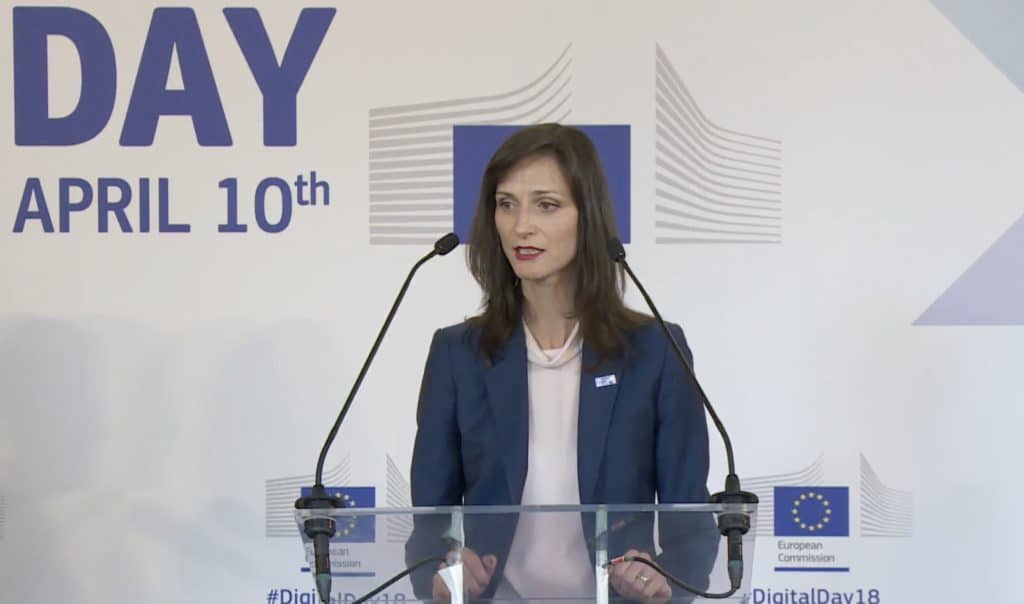Ventidue paesi europei (Italia assente…) hanno firmato oggi, durante il Digital Day 2018, una dichiarazione sull’istituzione di un partenariato europeo per lo sviluppo delle tecnologie blockchain. Il partenariato, che segue a stretto giro l’accordo sull’Intelligenza Artificiale, sarà uno strumento di cooperazione tra gli Stati membri e avrà l’obiettivo di condividere esperienze e competenze in campo tecnico e normativo e preparare il lancio di applicazioni della blockchain su scala europea, a vantaggio dei settori pubblico e privato. Ciò dovrebbe garantire che l’Europa continui a svolgere un ruolo guida nello sviluppo e nella diffusione delle tecnologie blockchain.
Indice degli argomenti
La Blockchain sempre più presente nei servizi digitali
La blockchain, essenzialmente tecnologia finalizzata alla promozione della fiducia degli utenti, consente di condividere informazioni on-line, concordare e registrare le transazioni in modo verificabile, sicuro e permanente. La tecnologia è già in uso, e gode di un discreto successo, soprattutto nei servizi finanziari, ma si prevede che nei prossimi anni diventerà sempre più operativa e integrata in un numero crescente di servizi digitali, quali la rendicontazione normativa, l’energia e la logistica.
La soddisfazione della Commissione
Mariya Gabriel, commissaria per l’economia e la società digitali, ha accolto con favore la firma della dichiarazione: “In futuro tutti i servizi pubblici utilizzeranno la tecnologia blockchain. La blockchain rappresenta una grande opportunità per l’Europa e gli Stati membri di ripensare i propri sistemi informativi, promuovere la fiducia degli utenti e la protezione dei dati personali, contribuire a creare nuove opportunità commerciali e stabilire nuove aree di leadership a vantaggio dei cittadini, dei servizi pubblici e delle imprese. Il partenariato lanciato oggi consente agli Stati membri di collaborare con la Commissione europea per trasformare l’enorme potenziale della tecnologia blockchain in servizi migliori per i cittadini”.

Potenzialità della blockchain
La natura decentrata e collaborativa della blockchain e delle sue applicazioni consente di sfruttare appieno la dimensione del mercato unico digitale. Una stretta cooperazione tra gli Stati membri può contribuire ad evitare approcci frammentari e può garantire l’interoperabilità e una più ampia diffusione dei servizi basati su blockchain. Il partenariato contribuirà alla creazione di un contesto favorevole, nel pieno rispetto della normativa dell’UE e di chiari modelli di governance che aiuteranno i servizi che utilizzano la catena dei blocchi a prosperare in tutta Europa.
Investimenti: passato e futuro
Nel febbraio 2018 la Commissione europea ha inoltre lanciato l’Osservatorio e il Forum dell’UE sulla blockchain e ha già investito oltre 80 milioni di euro in progetti a sostegno dell’uso della blockchain in ambito tecnico e sociale. Entro il 2020 saranno stanziati circa 300 milioni di euro in più per la blockchain.
I Paesi firmatari
I Paesi che hanno sottoscritto oggi la dichiarazione sono: Austria, Belgio, Bulgaria, Estonia, Finlandia, Francia, Germania, Irlanda, Lettonia, Lituania, Lussemburgo, Malta, Norvegia, Paesi Bassi, Polonia, Portogallo, Regno Unito, Repubblica ceca, Slovacchia, Slovenia, Spagna, Svezia. Altri, membri dell’UE e dello Spazio economico europeo, sono stati invitati ad aderire al partenariato europeo per la blockchain.
Il testo dell’accordo (inglese)
In October 2017, the European Council asked the European Commission to present a European approach to blockchain and invited the Commission to put forward initiatives for strengthening the framework conditions that enable the EU to explore new markets and to reaffirm the leading role of its industry.
The European Commission already launched the EU Blockchain Observatory and Forum in February 2018 and will invest some € 300 million in projects supporting the use of blockchain in a number of technical and societal areas through its programme Horizon 2020. Member States have been very active in supporting blockchain ecosystems, beginning experiments and announcing actions at government level. The private sector is also actively pioneering blockchain to improve efficiency, enhance trust and promote growth. Blockchain and distributed ledger technologies are seen as particularly promising in ensuring more security, integrity and transparency when delivering services, enforcing regulations and ensuring efficiency in legal compliance.
In order to harness the many opportunities of blockchain and avoid a fragmented approach, the signatories of this declaration agree to cooperate to establish a European Blockchain Partnership with a view to developing a blockchain infrastructure that can enhance value-based, trusted, user-centric digital services across borders within the Digital Single Market.
I – The signatories of this declaration recognise the potential of blockchain to transform digital services in Europe.
- Europe is well placed to take a global leadership position in the development and application of blockchain and distributed ledger technologies which can change the way citizens and organisations collaborate, share information, execute transactions, organise and deliver services.
- Blockchain-based services have the potential to enable more decentralised, trusted, user-centric digital services, and stimulate new business models benefiting our society and the economy. Such services will create opportunities to enhance services in both public and private sectors, notably making better use of public sector information while preserving data integrity, and providing better control of data by citizens and organisations interacting with public administrations, reducing fraud, improving recordkeeping, access, transparency and auditability, within and across borders.
II – The signatories of this declaration will work together towards realising the potential of blockchain-based services for the benefit of citizens, society and economy.
- Close cooperation between Member States towards a European ecosystem for blockchain services and applications can avoid fragmented approaches. It can enable the development of interoperable frameworks for blockchain in Europe based on standardised solutions and governance models. Such cooperation can also strengthen compliance with regulations and regulatory convergence which is essential to support scalability of such solutions across borders.
- Further research and innovation actions gathering leading European industrial actors and academic institutions through collaborative projects, as already envisaged under Horizon 2020, are desirable to address scientific barriers and future developments of blockchain technologies, including theoretical models, scaling up and monitoring tools, security, architectures, data confidentiality and economic models.
- A blockchain services infrastructure building on existing initiatives, with governance involving public authorities, should support interoperability and open interfaces, with the highest standards of security, confidentiality and personal data protection compliance whilst offering economies of scale as compared to a plethora of non-interoperable private blockchains. Such a trusted framework may provide a level playing field and foster competition, with SMEs and start-ups being able to access and provide cross-border services on an equal footing with larger players. Once established, such services could be used to support trusted digital services on the internet in general.
- The European Commission has already implemented similar cooperation through the Connecting Europe Facility’s Digital Services Infrastructure, where services such as eID, eProcurement, eHealth, Online Dispute Resolution (ODR) or Electronic Exchange of Social Security Information (EESSI) were successfully deployed for the benefit of citizens.
III. The signatories of this declaration will work together to support the following objectives of a European Blockchain Partnership:
- The signatories will each designate a Representative to work with the European Commission in order to take the partnership forward and to complete the following actions, drawing also on the expertise gathered through the EU Blockchain Observatory and Forum:
- By September 2018, identifying an initial set of existing cross-border digital public sector services that would gain added value from the support of a blockchain services infrastructure, and start exploring other use cases;
- By the end of 2018, assisting the Commission in preparing the technical specifications of this initiative, defining the appropriate governance model and identifying other framework conditions which are essential to its success (including compliance with regulatory requirements). Due consideration should be given to possible cooperation between the public and private sector;
- The signatories of this declaration will share experiences, best practice and key takeaways related to the implementation of blockchain applications.
The signatories of this declaration invite the European Commission to take the necessary steps, where appropriate in support of the objectives of this Declaration, and in particular by proposing blockchain as a new Digital Service Infrastructure in the work programme under the Connecting Europe Facility and by continuing support to blockchain projects under Horizon 2020. The intention is to launch the first cross-border actions by the end of 2019.
The signatories of this declaration invite all Member States, EFTA and EEA Countries to join this cooperation.




